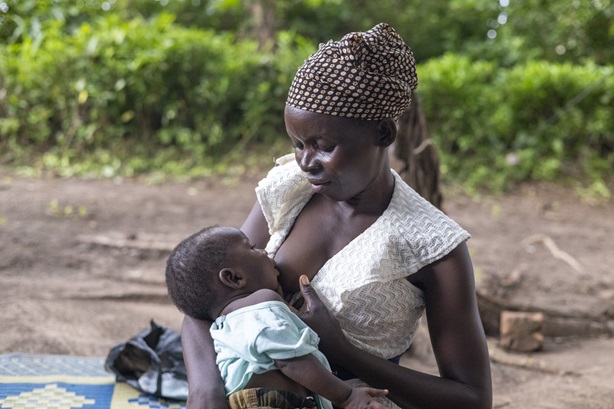Catherine Anyaso breastfeeding her baby. |Courtesy: UNICEF|.
People of South Sudan joined the rest of the World to celebrate Breastfeeding Week amid the looming hunger and economic meltdown in their country.
The world’s youngest nation continues to grapple with an escalating humanitarian crisis partly brought about by subnational violence, climate change, displacement, and soaring living costs, pushing millions of families into food and nutrition insecurity.
According to reports, 9 million people require humanitarian assistance in 2024.
The Integrated Food Security Phase Classification (IPC) projects that 7.1 million people face severe food insecurity (Crisis levels or higher) during the April-July lean season. Of the 7.1 million people, 2.3 million in Jonglei and 79,000 in Northern Bahr el Ghazal States face Emergency and Catastrophe food insecurity levels, including areas inhabited by new arrivals from Sudan.
Ministry of Health in collaboration with UNICEF, and partners on Thursday, 1 August celebrated World Breastfeeding Week and called for breastfeeding support for all by closing the gaps in South Sudan.
More actions are needed to protect, promote, and support exclusive breastfeeding for children under six months to reach the national target of 80% in 2027.
South Sudan made commendable progress in the past decade, and levels of exclusive breastfeeding of children under six months have increased from 45% in 2010 to 60% in 2023.
However, more is needed, as four out of every ten newborns remain deprived of their right to a healthy start and missing appropriate first food in the first six months of life. Breastfeeding is the best way to prevent infant morbidity, mortality, and malnutrition to attain optimal growth and development.
Exclusive breastfeeding up to six months and complementary feeding after six months, along with continued breastfeeding until a child turns two years old, helps build immunity and protects them against common childhood illnesses.
Exclusive breastfeeding is also the most defensive weapon in a mother’s arsenal to protect her child from malnutrition.
“Universal implementation of baby-friendly hospital initiative is essential to support early and continued breastfeeding for all babies. Besides, working with community members to scale up breastfeeding support focusing on vulnerable populations will help to close the gaps in breastfeeding rates”, said Undersecretary for Health, Hon Dr Harriet Pasquel.
When an infant is exclusively breastfed during the first six months of their life, they receive the most nutrient-rich foods through breastmilk, which provides optimum health benefits and ensures their survival and adequate physical growth and cognitive development.
To reach the 2027 national target of 80% of children exclusively breastfed, the whole of society must address women’s barriers to breastfeeding exclusively. Providing enabling workplaces is one crucial factor to that success.
While the Ministry of Health, UNICEF, and their partners work hard to ensure that malnourished children are provided with necessary therapeutic and feeding centres are set up, more needs to be done to reduce and prevent malnutrition in the first place.
Exclusive breastfeeding of infants for up to six months, coupled with complementary foods until they turn two years of age, will help prevent and mitigate the onset of malnutrition among children in South Sudan.
“UNICEF calls for improved policies supporting breastfeeding in the workplace, such as increasing the period of paid maternity leave to 18 weeks aligned with global standards. It is important to increase funds to prevent malnutrition in South Sudan. Lactating mothers should receive appropriate breastfeeding breaks, work-site facilities, and breastfeeding support. Making these policies work for mothers worldwide will accelerate progress,” said Hamida Lasseko, UNICEF Representative in South Sudan.
Early initiation of breastfeeding within the first hour of birth, followed by exclusive breastfeeding during the first six months of life, and continued breastfeeding for two years or more, is the best possible start a child can receive.
Breastfeeding is critical in preventing malnutrition, infant morbidity, and mortality, particularly against common childhood illnesses like diarrhea and pneumonia.




